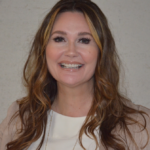Director, Electronic Publishing and Production, SLACK Incorporated

Please tell us a bit about yourself (e.g. hometown, current locale, course of study).
I’ve lived in southern New Jersey my entire life. I grew up in a small town, and after college, I moved with my husband to the small town where he grew up. Now, we’re just a month away from our daughter graduating from the same high school he did. Rounding out our family is a very spoiled small dog and two chubby, lazy cats.
It’s interesting. Growing up, the careers I was drawn to have to do with ‘making things better’: interior decorator, makeup artist, psychologist, teacher, and editor. I will say, I’ve incorporated all of these aspects into my life – I love ‘styling’ my house, makeup is my hobby and passion, and between being a parent and a manager, I’ve honed my teaching and psychology skills.
What was your first scholarly publishing role? How did you get that job? What path led to your current position?
When I started college, I thought I wanted to become a psychologist. My first research course quickly changed my mind! After a brief dabbling in art history (museum docent jobs are few and far between), I transferred colleges and selected Elementary Education and English as my majors at Glassboro State College (which became Rowan College of New Jersey and is now Rowan University).
Although I enjoyed Elementary Education, teaching jobs in our area were scarce, and I had to think hard about what my career path would look like. My then-boyfriend, now husband, had a family member in publishing (my current employer, in fact!), and she suggested I explore an editing career. Right away, I knew I’d made the right decision, and I’ve been at SLACK Incorporated ever since (nearly 25 years).
Describe some of your current responsibilities, and what type of organization you belong to.
SLACK Incorporated is a small, family-owned, for-profit health care publisher. My current role as Director, Electronic Publishing and Production, focuses on systems – peer review, production, and content management – and their associated workflows. For example, I manage technical implementation for new vendor (and sometimes platform) partners, ensure consistent metadata delivery to continuing partners, train staff on production duties and changes, write and institute standard operating procedures, promote superior user experience for our readers and authors, explore new technologies and partners, and promote our company and journals in the larger arena of scholarly publishing.
If there was a pivotal moment or key person in your career development, please describe briefly.
You could certainly say my husband’s cousin, Lynne Leadbeater, suggesting that I consider becoming an editor was a key first step in my entire career path. I’d also acknowledge my first manager, Kaye Coraluzzo, who took a chance hiring someone who had primarily child care jobs and substitute teaching on her resume for an editorial position. Finally, a big thank you goes to my current supervisor, Jennifer Kilpatrick, who has served as an informal mentor, who always championed my advancement, and who encourages me to learn new skills and involve myself in different processes, much of which has informed my current role.
What tools, web sites, and organizations do you find most valuable for your career development?
SSP has been a vital part of my career development, particularly in the past few years. Once I became a member, began attending the Annual Meeting, getting involved in the mentorship program, and then volunteering on a committee, the larger world of scholarly publishing really opened up for me. I’ve made so many incredible connections and friends through SSP and have taken advantage of some amazing opportunities. I’ve served as both a mentee and mentor in the Mentorship Program; I’m the Deputy Co-Chair of the Career Development Committee (working on the Mentorship Program and two new initiatives); I’ve written a blog post for The Scholarly Kitchen; and my colleagues and I had our first concurrent session proposal, as well as a poster, accepted for the 2020 annual meeting.
The Scholarly Kitchen is invaluable in keeping me apprised of all things going on in and affecting the scholarly publishing landscape. Twitter is also helpful, whether it’s related to live tweets from a meeting, learning more diverse perspectives about various issues, or just keeping in touch with scholarly colleagues around the world.
Other professional groups that have fostered my career development are the Council of Science Editors (where I volunteer on the Professional Development Committee), the International Society of Managing and Technical Editors, and the Board of Editors in the Life Sciences (where I’m currently Chair of the Marketing and Promotions Committee).
What do you wish you knew more about?
I wish I knew more about XML and how it can be used to enrich our content and expand discoverability; data collection/analysis and how to use the results to best serve our authors and readers; and project management principles to improve my ability to keep projects on track and successful.
What advice would you give to people interested in a career in scholarly communications?
Be curious. Familiarize yourself with all aspects of your job, the company, and the industry. Talk to everyone you can because you can learn something from everyone, and you can make some amazing friends and connections. Volunteer with scholarly organizations; you’ll rise by helping them. Always be willing to learn and do more (within reason): It’s not just good for your career; it’s good for you as a professional and as a person.

